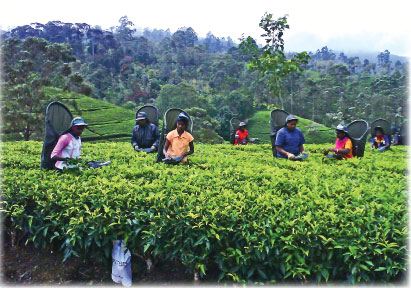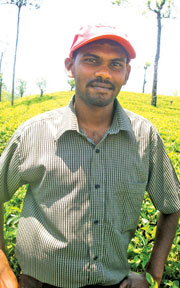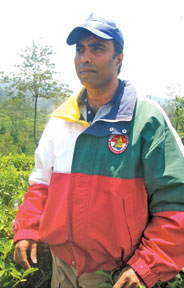Innovative field practices for sustainable development in tea
industry
By Gamini WARUSHAMANA
S. Kalyani (53) has been working as a tea plucker in Alton Estate in
Upcot, Maskeliya for the past 39 years and she followed the same
traditional tea plucking system which was followed by her ancestors over
centuries. However, in 2010 the estate management introduced new tools
and working culture to increase productivity by mechanising of tea
plucking and to improve the working conditions, positively changing
their attitudes towards the trade.
 |
|
over 58 percent
pluckers at Alton Estate use the new technology |
As a result Kalyani's working conditions improved in the recent past
and her traditional dress code has changed from cloth and jacket and
polythene used to cover the body to water proof bottoms, a T-shirt,
gloves and boots.
Her traditional heavy bamboo plucking basket weighing 2-3 kg has been
replaced by a new 600g weight specially designed 'Collapsible Tea
Plucking Basket' and she now uses a pair of shears to pluck tea leaves,
which has tremendously increased production.
"I am a grandmother and at first I felt shy to wear a pair of
trousers and T-shirts at this age and also felt that hand plucking was
convenient. However, we gradually got used to new tools and working
practices and today we have realised their value.
With the use of these tools my monthly income has tripled and we can
pluck more tea leaves compared to what we plucked by hand" Kalyani said.
In 2010, the senior manager of Alton Estate Hemantha Kahatapitiya
took a bold decision to radically change the working practice in tea
estates and use new technology which is now readily available after so
many decades but this has not attracted much attention in the tea
industry.
Today 215 tea pluckers or 58 percent of the pluckers at Alton Estate
use a pair of shears, plucking baskets, gloves and uniforms while
working.
Kahatapitiya has learnt the art of changing attitudes and introducing
new concepts to estate workers who believe the work to be ana arduous
task. "I tested these new tools when I was the manager at Gouravilla
Estate, and it was successful. We gradually increased the use of shears.
Twenty six percent of pluckers in Gouravilla Estate began using the
new techniques. It is true that the introduction of new concepts is
difficult for uneducated estate workers but once they realise the value,
specially financial gain they get, they go for the changes", he said.
At Alton Estate he used small groups of young pluckers and they were
trained to use shears, new plucking baskets and uniforms were introduced
and helped to change their attitudes. Productivity increased and they
began to earn higher incomes and later the others also adopted and began
to use these tools, he said.
 |
 |
| Assistant Manager, Dilroy Manohar |
Senior Manager Hemantha Kahatapitiya, |
"Last year wages increased by 30 percent while Net Sales Price (NSP)
dropped. This has been a serious blow to the industry and as a result
most of the plantation companies last year incurred huge losses.
However, we managed to reduce our losses due to significant improvement
in productivity with the use of new technology," Kahatapitiya said.
Higher cost of production is one of the major constraints that makes
it difficult for Ceylon tea to compete in international markets.
The average cost of production of tea in Sri Lanka is about $ 2.2 per
kg which is reported to be the highest among tea growing countries where
the COP ranges from $0.75-1.35 per kg in other competing countries. Last
month the cost of production was estimated as $3. per kg while NSA has
fallen to $3.2 per kg.
In the cost component, labour costs accounts for 60 percent of the
cost of production and is continuously increasing as strong trade unions
are capable of winning wage increase as the cost of living rises.
According to the Officer-in-Charge of the Tea Research Institute
(TRI) Low country station, Ratnapura, Dr. M.A. Wijerathne, the land and
labour productivity of tea in Sri Lanka is reported to be less than that
of other tea growing countries such as India and Kenya. Researchs
advocate to increase labour productivity to face the problem.
However, there are limited options in labour productivity increase in
this highly labour intensive industry and there is a limit in increasing
output per person, specially in plucking green tea leaves. Dr.Wijerathne
is also the inventor of these technologies and he holds the patent
rights for selective tea harvester (shear) and Collapsible Tea Plucking
Basket.
The selective tea harvester is a shear attached to a small tray. The
tea leaves cut are collected into the tray and the level of cut
(selection) can be measured by the height of the tray. Traditionally the
pluckers use a long stick to find the level or select leaves.
The Collapsible Tea Plucking Basket is a specially designed canvas
basket weighing less than 600 grams. Pluckers can collect around 6 kg of
tea leaves to the basket, a reasonable amount that a plucker can hold.
The basket is fitted to the shoulders and hip as well as to the head
by a cap attached to the basket. Usually tea pluckers fixed their cane
baskets to the head and this traditional practice was also considered in
designing the basket. Dr. Wijerathne said that the new plucking
practices improves labour productivity as well as the quality of tea.
Dr. Wijerathne said that these tools are available and have been
commercially produced since 1997, and proved that they are highly
successful in increasing labour productivity.
 |
|
Young tea pluckers equipped with the
new technology, |
However, these tools have not attracted the attention of tea
smallholders or planters and attempts to introduce them failed as
pluckers prefer the conventional hand plucking practices. Changing
attitudes and practices used over centuries by the people is not easy
and it is common for the uneducated poor workers in the tea estates, tea
smallholders as well as planters to reject the new concepts. However,
now the demand for shears is increasing and estate companies have
started to introduce the technology. Last year over 5000 units of shears
were sold. Innovative field practices in tea plantations is the way
forward for sustainable development in the industry, Dr. M.A. Wijerathne
said.
These factors together with lower income have caused social issues
and the tea industry is no longer an attractive industry for the younger
generation. As a result there is a severe labour shortage in the
plantation sector, especially in the large estates-owned by plantation
companies.
On the day we visited Alton Estate the plucking Kangani
T.Chandrasekar said that he needs 75 pluckers a day for the division he
had planned, but only 43 pluckers turned up.
This situation is the same every day, he said. Although there are
around 700 workers on the payroll, only 50-60 percent of them attend
work.
As a result of the delay in plucking the quality of made tea
deteriorates. If the traditional plucking method is used, 12-14 pluckers
are needed If the shears are used only 7-8 pluckers were needed
following the new practice, the yield of Alton estate has increased by
around 300 Kg, Kahatapitiya said.
Although the plantation companies charge that the cost of labour is
high, it does not mean plantation workers were living comfortable lives.
In Sri Lanka, poverty is the highest in the plantation sector and the
situation is gradually improving. A labourer is entitled to Rs.572 per
day including EPF and ETF. Without these deductions, the daily wage is
only Rs.515, and this is the lowest in all industries.
However, plantation workers, especially tea pluckers can earn an
extra income by plucking more than the standard amount- the minimum
amount pluck per day.
The norm is 18kg per day and Rs.19.50 per kg pay for every extra kg
plucked in a day. Young pluckers such as S. Sevendi (24) are using the
new tools and have increased their earnings. Sevendi who has studied up
to the GCE Ordinary Level said that she can pluck around 20 kg extra or
around 40 kg total a day and earn around Rs.18,000 monthly. During the
crop season the total amount that could be plucked per day increases to
around 60 -70 kg, she said.
Experienced pluckers who have accustomed themselves to the new tools
can pluck around 100 kg per day, the Assistant manager of Alton Estate
Dilroy Manohar said.
Manohar assured that the use of shears does not reduce the yield of a
tea bush. "According to our statistics there is an increase in the
yield", he said. In the 2010/11 financial year, our yield was 1604 kg/
he and it is higher compared to 1453kg/he in 2009/10. In the 2011/12
financial year we had already exceeded last year's yield and this year's
yield will be over 1800 kg/he, the highest in the estate, Manohar said.
|

